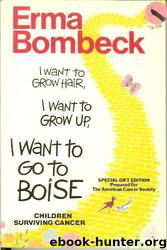I Want to Grow Hair, I Want to Grow Up, I Want to Go to Boise by Erma Bombeck

Author:Erma Bombeck [Bombeck, Erma]
Language: eng
Format: epub
Tags: Cancer in Children, Optimism
ISBN: 9780060161712
Google: WyWrLwAACAAJ
Amazon: 006016171X
Publisher: Harper & Row
Published: 1989-05-15T04:00:00+00:00
8
What Are Fathers For?
"June! I'm home!"
Ward Cleaver, father
"Leave It to Beaver" television series
Can you imagine being so invisible you have to announce your presence when you walk in the door? It has always been the perception of Dads from Jim Anderson of "Father Knows Best" to Jason Seaver on "Growing Pains"... from Ozzie's greeting to Harriet to Jack Arnold walking through "The Wonder Years."
They're fathers who rarely have starring roles in the chronicles of family life. They come home, turn off a few lights, read the paper, eat dinner, scratch the dog behind the ears, and go to bed. If a demolition ball like cancer hits the family while they're gone, it's business as usual.
"I'm a salesman and I'd be driving down the highway and I'd pull over and bawl for forty-five minutes or I'd be talking with a customer and all of a sudden I'd just walk out and get in the car and leave."
Fathers have a reputation for going through life like they have bodies shot full of Novocain. They're cool. They have a certain dignity and distance to maintain—no matter what.
"My Dad won a trip to Orlando, Florida, for me when he entered a Jell-0 Gelatin Jump. For this he had to jump into four hundred gallons of Strawberry Jell-O. I never thought my Dad would do this."
Fathers are also endowed with a strength and detachment that permits them to witness harsh situations and not fall apart.
When Ken decided to share responsibilities with his wife he accompanied his daughter, Mary Beth, to her spinal tap. When Mary Beth groaned, Ken turned white as a sheet and fainted dead away.
So much for Father Teresa and so much for the three popular myths surrounding fathers. The truth is men are just as vulnerable, just as caring, just as devastated as their wives when cancer strikes their children.
But the male species is elusive. The outpouring of feelings I had hoped to assemble in a folder marked "DADS" never materialized. When I opened the white envelope it looked like the one our son had marked "INCOME TAX RECORDS"—there wasn't a scrap of paper in it.
In my inquiries, fathers began to take on a "rare bird" dimension. "Is it true you spotted a three-piece-suited Father last week? Does he talk?" "You had a male-breasted Father at camp and didn't call me?" "I know there are thousands of species of Dad Childwatchers out there, but where do they flock?"
In June 1988, three fathers were sighted in Portland, Oregon. All three had daughters with cancer and had become friends through Candlelighters events. I flew to Portland where we dined over prime rib and a tape recorder. They had all lived with cancer long enough to be comfortable talking about it.
Their perspective was not the same as those of mothers.
Fathers have traditionally been the ones who parked the car in the rain, took the family picture, checked out noises in the basement, or put the dog to sleep. They are charged with keeping things moving. Their roles in cancer are much the same.
Download
This site does not store any files on its server. We only index and link to content provided by other sites. Please contact the content providers to delete copyright contents if any and email us, we'll remove relevant links or contents immediately.
Periodization Training for Sports by Tudor Bompa(8257)
Why We Sleep: Unlocking the Power of Sleep and Dreams by Matthew Walker(6707)
Paper Towns by Green John(5181)
The Immortal Life of Henrietta Lacks by Rebecca Skloot(4581)
The Sports Rules Book by Human Kinetics(4379)
Dynamic Alignment Through Imagery by Eric Franklin(4209)
ACSM's Complete Guide to Fitness & Health by ACSM(4058)
Kaplan MCAT Organic Chemistry Review: Created for MCAT 2015 (Kaplan Test Prep) by Kaplan(4009)
Introduction to Kinesiology by Shirl J. Hoffman(3766)
Livewired by David Eagleman(3765)
The Death of the Heart by Elizabeth Bowen(3611)
The River of Consciousness by Oliver Sacks(3599)
Alchemy and Alchemists by C. J. S. Thompson(3516)
Bad Pharma by Ben Goldacre(3422)
Descartes' Error by Antonio Damasio(3272)
The Emperor of All Maladies: A Biography of Cancer by Siddhartha Mukherjee(3155)
The Gene: An Intimate History by Siddhartha Mukherjee(3095)
The Fate of Rome: Climate, Disease, and the End of an Empire (The Princeton History of the Ancient World) by Kyle Harper(3061)
Kaplan MCAT Behavioral Sciences Review: Created for MCAT 2015 (Kaplan Test Prep) by Kaplan(2985)
